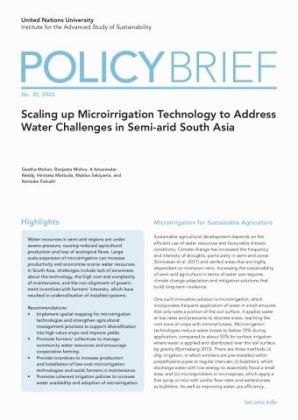A new UNU-IAS Policy Brief highlights microirrigation as an innovative solution to improve water management and increase agricultural production in South Asia. The brief, Scaling up Microirrigation Technology to Address Water Challenges in Semi-arid South Asia, examines current barriers to large-scale adoption of the technology and provides recommendations to facilitate implementation. Written by Geetha Mohan, Ranjeeta Mishra, A Amarender Reddy, Hirotaka Matsuda, Makiko Sekiyama, and Kensuke Fukushi, the brief is an output of the UNU-IAS Water for Sustainable Development project.
Highlights
Water resources in semi-arid regions are under severe pressure, causing reduced agricultural production and loss of ecological flows. Large scale expansion of microirrigation can increase productivity and economise scarce water resources. In South Asia, challenges include lack of awareness about the technology, the high cost and complexity of maintenance, and the non-alignment of government incentives with farmers' interests, which have resulted in underutilisation of installed systems.
Recommendations:
- Implement spatial mapping for microirrigation technologies and strengthen agricultural management practices to support diversification into high-value crops and improve yields.
- Promote farmers’ collectives to manage community water resources and encourage cooperative farming.
- Provide incentives to increase production and installation of low-cost microirrigation technologies and assist farmers in maintenance.
- Promote coherent irrigation policies to increase water availability and adoption of microirrigation.


![smart2[1].png](https://unu.edu/sites/default/files/styles/card_view_small/public/2024-04/smart2%5B1%5D.png?itok=_-ZcLOM5)

